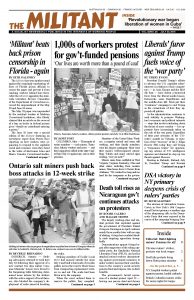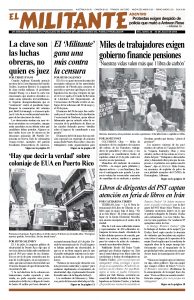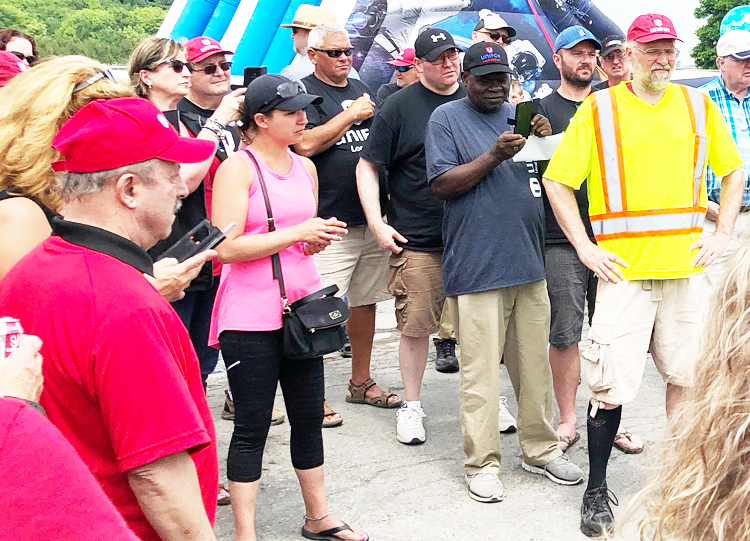GODERICH, Ontario — Striking salt miners returned to work here July 18 following their approval of a new contract two days earlier. Compass Minerals’ bosses were forced to the bargaining table following determined mass actions by the strikers with the active support of local farmers, who blocked the company’s deployment of scabs aimed at breaking the strike.
Striking members of Unifor Local 16-O had massed outside the mine July 4 and built a barricade of wooden pallets across the road to block buses from transporting replacement workers in and out. The scabs had been flown in by the company.
When the court ordered them to remove the pallets, they complied. But they turned for solidarity to local farmers, who brought in tractors to block the road, maintaining the barricade trapping the scabs inside. Many strikers are from farm families. When the union put out the call for help, the first tractor arrived within half an hour.
“The solidarity and support we have been shown by our own town and the hundreds of sisters and brothers in the labor movement has made all the difference,” Gary Lynch, president of Unifor Local 16-O, said after the vote.
“Thank you for teaching scabs a lesson and making the union movement relearn that the only way to get things done is to shut it down,” Canadian Union of Postal Workers National President Mike Palacek told striking salt miners and their supporters at an event for strikers’ children on the picket line in front of the mine July 13.
The strike began April 27 after the 348 miners rejected the bosses’ demand for deep concessions that could create unsafe and unsustainable working conditions and do damage to the quality of their lives after work.
“We’re on strike because the company wants to impose 12-hour shifts — four hours of mandatory overtime each day means 60 hours a week — and 72 hours every fourth week,” Mike Baer, a shaft worker with 30 years in the mine, told the Militant. “And they’re going after pensions and benefits.”
The company tried to get workers to cave in by offering an insulting $10,000 signing bribe. One worker called it “a rotten carrot,” because payment was conditional on achieving virtually impossible production levels.
The three-year deal workers voted up includes a 2.5 percent wage increase in both 2018 and ’19 and 3 percent in 2020. It keeps pensions and benefits workers won in the past, defeating the bosses’ efforts to slash them. The company’s demand for mandatory overtime was dropped. At the same time, workers voted to give their consent to the company requesting from the Ontario government permission to impose a 60-hour workweek on some shifts. Some workers said they didn’t like the new contract. “I don’t say we agree on everything, but we will be back at work,” Lynch said.
A layer of the strikers have a long continuity of decades of union struggles to establish what the bosses tried to demolish, like load operator Bruce Uttley, whose 50th anniversary in the mine is July 26. Hired when the mine opened, he has been in 11 strikes and was determined to fight this one before retiring.
Support for strike ‘overwhelming’
“I support Unifor Goderich Mine Workers Local 16-O” read signs sprouting from lawns throughout this town of 8,000. Kay Edward, a member of Canadian Union of Public Employees Local 1427, had a sign in her yard. She said she “supports our brothers and sisters down there. They shouldn’t have to accept the company’s demands.”
School board worker Mandy Powell, whose husband and all his brothers work in the mine, said the support the unionists received was “overwhelming” and “every gesture is deeply appreciated.”
This reporter, a Walmart worker, received a warm reception to a solidarity card I delivered signed by 10 workers at two Montreal stores.
“We have gotten support from all across Canada, with donations of all kinds,” Baer said. “Last Saturday I met Unifor members from British Columbia and Newfoundland organized by their own locals to come here. We also had a busload of striking York University teaching assistants, CUPE members from Children’s Aid and nurses with us here on the line.”
“I came here on one and a half hours’ notice,” said Cheryl Gignac, a member of Unifor Local 24 who works at Greenshield in Windsor. “At first I said no. But then I thought about the importance of what the miners are doing and the respect I have for the union rep who asked me to go. So, I changed my mind and came. I’ve never done anything like that in my life — and I’m glad I did.”


